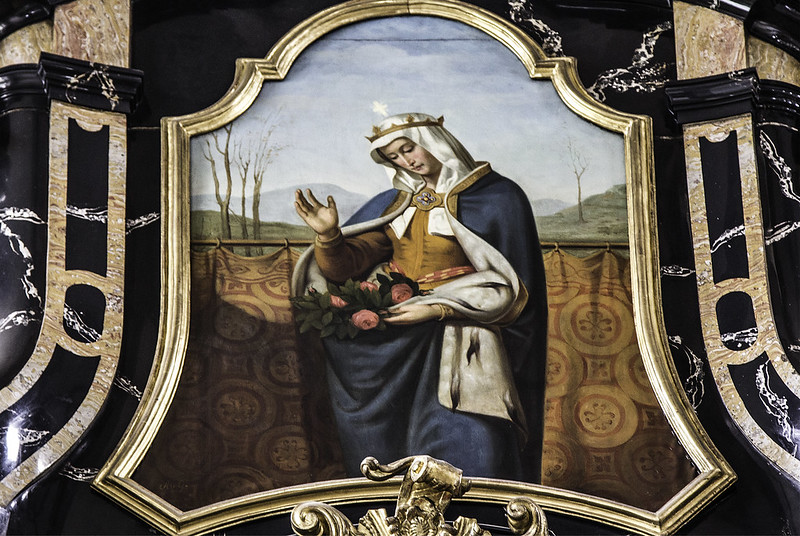 When we think of Joseph, our thoughts are drawn to Nazareth, to the hidden life of the Holy Family. We should feel at home there, because their experience of the family life was not unlike ours today, ordinary, obscure and routine.
When we think of Joseph, our thoughts are drawn to Nazareth, to the hidden life of the Holy Family. We should feel at home there, because their experience of the family life was not unlike ours today, ordinary, obscure and routine.
“Through God’s mysterious design, it was in the family that the Son of God spent long years of a hidden life. It is therefore the prototype and example for all Christian families,” we read in Familiaris Consortio (n. 82).
In the company of Jesus, Mary and Joseph, parents and their children can also grow in wisdom, in favour with God (Lk. 2:52) and in love. Human love, on which the family is founded and maintained, flourishes like that of Joseph and Mary when it is animated by the grace of God from above. The media images of marriage and family life today give the impression that the family based on marriage is the tomb of love. Through Joseph and Mary, however, God who is the source of love lined among us and continues to live among us we keep Him in our midst (Mt. 18:20). And so Nazareth is like a compass in these confusing times, gently showing what the family is meant to be in God’s plan: the cradle of life and the sanctuary of love.
Husband and Father
Joseph’s example of giving himself heart and soul through his life and work to God, and through God to Mary and Jesus, defines what being a loving husband and father involves. At the heart of the household of Nazareth was Mary, the beloved wife of Joseph and Mother of Jesus. Observing that God had joined them together in a real marriage, Pope Leo XIII wrote in Quamquam pluries, the only encyclical latter we have on St. Joseph: “When God gave Joseph as husband to the virgin, he gave him a companion in life, a witness to her maidenhood, a guardian of her honour.”
Going back to Nazareth with Joseph, teaches us what family life is, a sacred institution of the Creator and a foundation for Church and society. “Let us learn from Nazareth that the formation received at home is gentle and irreplaceable,” observed Pope Paul VI on his memorable visit there.
To Joseph was entrusted the task of fostering the human growth of Jesus, “in wisdom, age and grace.” “We must recognise,” writes Pope John Paul II in his Apostolic Exhortation Redemptoris Custos (1989), “that Joseph showed Jesus by a special gift from heaven, all the natural love, all the affectionate solicitude that a father’s heart can know” (No. 8).
At the heart of Joseph’s “fatherhood” was the total gift of himself to Mary and her Son, using his time and talents at the service of the Messiah growing up by his side in his home. In return, Jesus “was obedient to them” (Lk. 2:51), respectfully returning the affection of his “parents.”
Intercessor
Intimately united on earth, Joseph still knows the way to the heart of Jesus, to the Holy Spirit and to the Father. “Jesus is so full of charity that He can never refuse Joseph’s prayer,” St. Bernard tells us. “How can He refuse anything to one who loved Him so tenderly and watched over Him so faithfully during His sacred infancy?”
There is a lovely Flemish poem concerning St. Joseph, which humourously illustrated the intercessory power of St. Joseph on our behalf. Certain complaints were being lodged in heaven that souls whom it was alleged had no business being there, had been allowed in. St. Peter kept a check-list and he maintained that all was in order. But then St. Joseph was accused: he had a ladder over the back wall and he was getting his clients into heaven that way. St. Peter put the accusation to him, saying he would have to stop it or else. “Very well,” St. Joseph said in his serene way, “I’ll go. But I’m taking my wife and Child with me!” And that was the end of that!
Silent and Hidden
Two other “lessons” we learn from the spirituality of Joseph at Nazareth are silence and work.
First, the lesson of silence. Not one word of Joseph is recorded. Sacred scripture speaks only of what Joseph “did”: “by their fruits you shall know them.” Humble, silent fidelity to Jesus Chris and his Blessed Mother is the mark of Joseph. The hiddenness of Joseph encourages us to seek holiness of life through the ordinary events of daily life. “St. Joseph is the model of those humble ones that Christianity raises up to great destinies,” observed Pope Paul VI in 1969. “He is the proof that in order to be a good and genuine follower of Christ, there is no need of great things – it is enough to have the common, simple and human virtues, but they must be true and authentic.” For this reason, the Church encourages husbands and fathers to imitate Joseph’s domestic virtues: industriousness, listening, patience and sacrifice, detachment from material possessions, purity of heart and faithfulness to grace.
Room for God
At Nazareth, in this school of the Gospel, Joseph helps us to understand the life of Jesus and the need to develop and deepen our spiritual life. Raising the mind and heart to God through prayer and work requires moments of stillness the hustle and bustle of family life. Noise and distraction are the hallmarks of the marketplace and TV culture; silence and the tranquillity of order are the marks of the presence of God. Peace and quiet in ourselves and our surroundings are necessary if we are to recreate the atmosphere of Nazareth in our homes. Obviously, laughter and the carefree playfulness of children in the home are a great blessing. But in order to leave ‘room at the inn’ for God in our homes, we need to understand the words of the Psalmist: ‘Be still and know that I am God.’ A quiet, disciplined lifestyle helps us to see the need for simplicity, for the humility of spirit, for detachment from material things. In this way we learn to treasure what is of true value in God’s eyes.
Meaning of Work
Then there is the lesson of work. Following in the footsteps of Joseph helps us to appreciate the personal meaning of work. Nazareth home of the ‘Carpenter’s Son,’ restores our awareness of the nobility of work, Pope Paul said. “Work cannot be an end in itself,” he declared, “its freedom and its excellence derive, over and above its economic worth, from the value of those for whose sake it is undertaken.” When work is undertaken as an expression of love for our family, it fosters personal development and maturity; it promotes health of body and mind and deepens our capacity to love, by drawing the family closer together. It is as if Joseph is appealing to us through St. Paul: “I appeal to you … to present your bodies as a living sacrifice, holy and acceptable to God, which is your spiritual worship.”
Let us sum up all this by recalling the blessing of Pope John Paul II in his Letter to Families: “May the Holy Family, icon and model of every human family, help each individual to walk in the spirit of Nazareth. May it help each family unit to grow in understanding of its particular mission in society and the Church by hearing the word of God, by prayer and by fraternal sharing of life. May Mary, Mother of ‘Fairest Love,’ and Joseph, Guardian of he Redeemer, accompany us all with the constant protection. I bless every family in the name of the Most Holy Trinity, Father, Son and Holy Spirit.”


